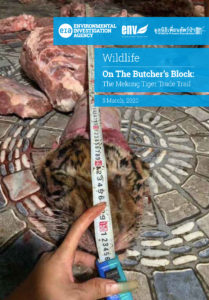 The March 2020 publication of Wildlife On The Butcher’s Block: The Mekong Tiger Trade Trail, coincided with the release of the recent BBC Natural World documentary “Tigers | Hunting the traffickers“.Three key environmental groups, Environmental Investigation Agency (EIA), Education for Nature Vietnam (ENV) and Wildlife Friends Foundation Thailand (WFFT) have been working together to document and map tiger farming and illegal trade to facilitate the closure of illegal activities which are perpetuating demand for tiger products and threatening the existence of wild tigers across Asia. The report provides a stark overview of how illegal trade and breeding skirts the legislation and looks at the interrelationship between the countries of China, Vietnam, Thailand and Laos. Essential reading.
The March 2020 publication of Wildlife On The Butcher’s Block: The Mekong Tiger Trade Trail, coincided with the release of the recent BBC Natural World documentary “Tigers | Hunting the traffickers“.Three key environmental groups, Environmental Investigation Agency (EIA), Education for Nature Vietnam (ENV) and Wildlife Friends Foundation Thailand (WFFT) have been working together to document and map tiger farming and illegal trade to facilitate the closure of illegal activities which are perpetuating demand for tiger products and threatening the existence of wild tigers across Asia. The report provides a stark overview of how illegal trade and breeding skirts the legislation and looks at the interrelationship between the countries of China, Vietnam, Thailand and Laos. Essential reading.
The report makes the following recommendations:
- End the domestic trade and use of tiger and other big cat parts and derivatives, including from captive specimens and non-native species
- Treat processed derivatives that are labelled as, marketed as or claim to contain tiger or other Appendix I big cats as “readily recognisable derivatives” to enable confiscation, arrest and prosecution
- Prohibit further growth of commercial captive tiger facilities and close those found to be involved in tiger trade
- Enable the phase-out of existing commercial captive tiger facilities and, in the interim, ensure transparent, rigorous
monitoring and inspection of captive tiger facilities, including the centralisation of databases of the captive tiger population, their stripe pattern and individual DNA profiles - Facilitate action against trade in tiger parts and derivatives online and via social media platforms
- Destroy stocks of tiger and other big cat parts and derivatives held by tiger farming and processing businesses and in Government stockpiles that are not required for forensic and prosecution purposes
- Governments and donors should ensure adequate funds to support:
- Investigation and enforcement that results in arrests, prosecution, conviction and seizure of assets of individuals and businesses involved in illegal tiger trade
- The development of forensic tools to profile individual tigers in captivity and determine lineage when tiger parts and cubs are seized to facilitate international enforcement efforts
- Targeted consumer behaviour change programmes to reduce demand for parts and products of tigers and other big cats
Parties to CITES are urged to:
- Support the CITES missions to be conducted under Dec 18.108 with technical expertise and financial assistance
- Propose further time-bound, country-specific actions to ensure implementation of CITES Resolutions and Decisions, with the objective of ending tiger farming, trade and demand
- Evaluate progress against a more robust set of indicators and be prepared to call for CITES trade suspensions
See what projects WildCats are funding to combat poaching of wild tigers and Amur leopards

